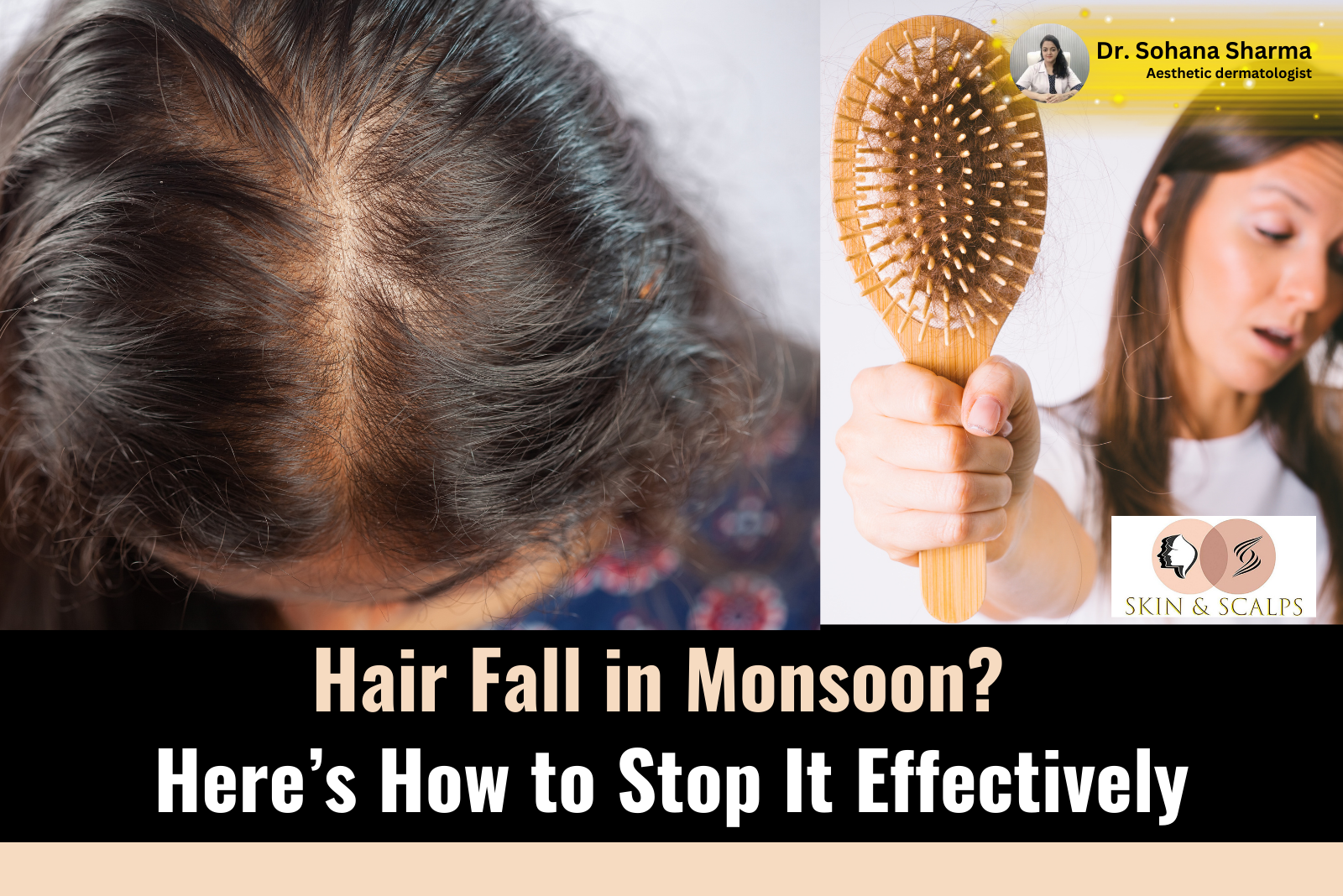Cool breezes, earthy scents, and the steady sound of raindrops are all brought about by the monsoon season. After scorching summer days, the air feels clean again and the streets sparkle. However, there is a secret drawback to this romantic season: it can be damaging to your hair. Hair shafts swell in humid environments, becoming weak and frizzy. The ideal environment for the growth of scalp infections is dampness. Additionally, rainwater can deplete your hair of its natural oils because it is frequently combined with dust and other pollutants. The outcome? increased hair loss, which can make your hair appear lifeless and thinning.
We at Skin & Scalps think you can enjoy the rain without worrying about your hair. Let’s examine the reasons behind monsoon hair loss and practical strategies for managing it.
Why Hair Fall Increases During Monsoon
The humidity during the monsoon causes the hair shaft to swell, which makes it more brittle. Moist conditions on the scalp provide a favorable environment for the growth of bacteria and fungi, which can cause dandruff and irritation of the scalp, both of which weaken hair follicles. Furthermore, rainwater isn’t always pure; it frequently contains contaminants that can deplete natural oils. As a result, the scalp becomes dry and more brittle. Also, abrupt temperature changes can interfere with the natural cycle of hair growth, increasing the amount of hair that sheds.
Keep Your Scalp Clean and Dry
Strong, vibrant, and healthy hair is largely dependent on a clean, well-maintained scalp. To get rid of pollutants, oil, and grime, wash your hair frequently. Choose a gentle, sulfate-free shampoo based on the type of your scalp. By doing this, product accumulation that could suffocate hair roots is avoided.
After every wash, make sure your hair is completely dry. Long-term dampness promotes fungal infections. To prevent heat damage, use a cool hair dryer setting or a gentle towel drying method.
Avoid Excessive Oiling
Although oil nourishes hair, too much of it can trap moisture and dirt during the monsoon season. This exacerbates issues with the scalp. Use light oils like coconut or argan oil once a week instead. To increase blood circulation without clogging pores, gently massage.
Within an hour, rinse the oil off. In humid weather, leaving it on all night could irritate the scalp. The secret to stopping hair loss is balance.
Choose the Right Hair Care Products
Harsh products harm the hair cuticle and remove natural oils. Choose shampoos and conditioners that contain natural ingredients such as amla, tea tree oil, or aloe vera. These strengthen hair and calm the scalp.
Humidity-induced frizz can also be controlled with a leave-in serum. To prevent scalp accumulation, make sure it is non-greasy and lightweight.
Eat for Healthy Hair
Hair health is greatly influenced by diet. Add foods high in protein and nutrients, such as healthy lentils, omega-rich fish, and fresh eggs. The building blocks of hair strands are proteins. To promote hair growth, include nuts, seeds, and vegetables high in iron.
Omega-3 fatty acids lessen inflammation of the scalp, and vitamin C from citrus fruits helps absorb iron. To keep the moisture balance of your scalp, stay hydrated. Your hair’s strength, texture, and vitality are all clearly influenced by what you eat.
Protect Your Hair from Rainwater
Avoid getting your hair wet with rainwater whenever you can. As soon as you get home, wash your hair if it occurs. By doing this, pollutants are eliminated and scalp infections are avoided. To shield hair from moisture, wear a scarf or keep an umbrella with you. These minor practices can lessen damage during the monsoon season.
Minimise Heat Styling
Overuse of blow dryers, curlers, and straighteners can weaken hair cuticles. Heat styling is useless and harmful in humid climates because styled hair rapidly loses its shape. If at all possible, let your hair air dry. Use a heat protectant spray to minimize damage if styling is necessary.
Manage Stress Levels
Seasonal hair loss can be exacerbated by stress. Engage in calming relaxation practices such as restorative yoga, mindful meditation, or slow, deep breathing. For healthy hair growth, getting enough sleep is just as crucial.
A healthy scalp environment is supported by a calm mind. Stress management is equally as crucial as outside care.
When to See a Dermatologist
See a specialist if hair loss persists after taking the right care. Continuous shedding could be an indication of underlying diseases such as nutritional deficiencies, scalp infections, or hormonal imbalances. In order to restore healthy hair, Skin & Scalps provides medical therapies, customized treatment plans, and advanced scalp analysis. Better outcomes are always obtained with early intervention.
Final Thoughts
Hair loss during the monsoon season is normal but not guaranteed. Despite the difficulties of the season, you can maintain healthy, strong, and shiny hair with the correct maintenance. Eat a balanced diet, keep your scalp clean, and shield your hair from too much moisture. We will help you appreciate the beauty of the monsoon season without having to worry about your hair. Let your stress, not your hair, be washed away by the rain.

